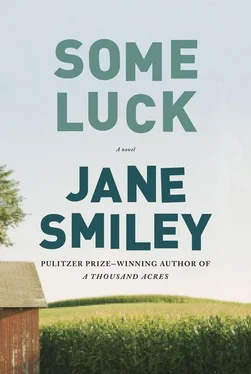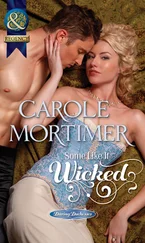It was Daddy who sat on the first egg, the one in the corner of the sofa. Debbie saw him, but didn’t say anything until he said, “What the—?” and sat forward. Yellow gunk was stuck to his shorts and dripping over shards of eggshell on the couch. Mommy started laughing. Dean sat up on his knees and started laughing, too. Daddy leaned forward and stepped on the egg under the coffee table. “Uh-oh,” he said, “minefield.”
Mommy went into the kitchen, opened the refrigerator door, closed it, and came back. She said, “They’re all gone. There were nearly a dozen.” She lifted Dean off the table and set him on the floor. Timmy said, “I didn’t do it, Mommy.”
Mommy turned to Debbie, who said, “Not me.” Daddy said, “We’re to assume that Deany laid the mines?”
Timmy nodded.
Daddy said, “Who opened the refrigerator door for him, Timothy?”
Timmy was frank, as always. “I did.”
Mommy said, “Who brought him downstairs?”
Debbie said, “He got out. He went down. I saw.”
Mommy got down on her hands and knees and crawled around the living room, picking up the eggs. She got every one except the one in the toy box, which Debbie handed her.
After everyone was cleaned up, and Mommy pulled a chair up to the stove and helped Timmy make the scrambled eggs, and Daddy set Dean in his high chair “to keep him out of range,” then helped Debbie set the dining-room table, they had breakfast: eggs, ham, toast, and pink sugar bunnies. When Daddy finished his eggs, he lit his cigarette and said, “Do you sportsmen and women know the story of Uncle Frank and the Canada goose?”
Debbie shook her head. Timmy shook his head. Dean whapped his spoon on his tray.
Daddy said, “Well, you know, Uncle Frank was a great hunter as a boy, and he used to go out into the fields with his long long shotgun, looking for rabbits and beaver and bears and even geese, and one day in the fall, he is lying in the grass, and he hears honking, so he looks up, and here comes a flock of Canada geese, black and white, looking for water, and Uncle Frank thinks that they are going to settle in the creek, which is a half a mile across. And he thinks that when they do that he is going to shoot one, and take it home for supper.”
Debbie looked at Mommy, who was smiling.
Daddy said, “So — the geese begin to come in for a landing, and Uncle Frank raises his shotgun and takes aim at the biggest one, and just as he’s about to pull the trigger, something falls out of the sky and bops him on the head, and he falls over, half knocked out.” Daddy’s head flopped to the side and his eyes rolled; then he sat up. “When he wakes up a few minutes later, there is a golden egg lying next to him. He picks it up. The geese are all honking like mad and running toward him with their wings up, hissing, and you know geese are pretty scary, but Uncle Frank was the bravest boy ever, and so he just sits there, clutching the golden egg, and a very big goose comes up to him and says, ‘That’s my egg.’ Like this.” And Daddy leaned toward Debbie and loudly hissed, “Dassssss my eggggssssss.” Debbie sat back in her chair.
“And she reaches out and opens her beak around the egg and starts pulling. Uncle Frank pulls, too, but then he says, ‘What will you give me for it?’ because Uncle Frank knows how to make a deal. And he leans over and hides the egg. What do you think the geese offered?”
Timmy said, “A dollar?”
“The geese didn’t have any money.”
Mommy said, “Maybe they offered a couple of ducklings.”
Daddy said, “Just to rid the world of those pesky ducklings, right? But Uncle Frank had no use for ducklings.”
Debbie’s gaze was wandering around the room, and she happened to see the famous golden feather, which Mommy kept in a glass cabinet with some nice dishes. She said, “A golden feather.”
Daddy said, “Did they have a golden feather?”
Debbie said, “They had one. It was old and they took very good care of it.” Debbie saw Mommy glance at the golden feather. “They thought that something bad would happen if they lost it.”
“So why would they trade it?” asked Mommy.
“Because there was a golden baby in the egg,” said Debbie. “They had to.”
“Yes!” said Daddy. “That’s exactly right. All of the geese got together and they brought out the golden feather from the little purse they kept it in, and the biggest goose carried it over to Uncle Frank, and they traded. And then a score of years went by, and something happened to that feather.”
“What?” said Timmy.
“One day, Uncle Frank was walking down the street in Chicago with that feather in his hand, and Aunt Andy, the love of his life, came walking by, and he gave her the feather, and they lived happily ever after.”
“They did,” said Mommy.
Later on, at church, right when the minister started talking about yet another thing that Debbie could not understand, Debbie turned her head toward the window and thought about the golden feather, and she knew that someday the golden feather would belong to her.
ROSANNA SIMPLY DID NOT say a word — not one word — about the fact that Minnie was living in the big house with Joe and Lois, and showed no sign whatever of moving out, or even thinking of moving out. It was easy enough to say that a thirty-three-year-old woman who wore her hair in a bun and never a brighter color than maroon was a dyed-in-the-wool old maid, and would certainly come in handy when this child was born who was coming in February, but Rosanna thought it was something out of her grandparents’ generation. In those days the countryside was full of old maids and widows and no one thought a thing of it, what with the Civil War and the cholera and the smallpox, but these days it looked strange and it was strange. However, not a word. Here she was, she had gotten everything she wanted and, as Walter said, “You’re still not satisfied.” They were finishing supper; Claire had already gone upstairs to do her homework.
“It’s not a question of being satisfied or not.” Rosanna stood up to clear the dishes.
“What, then?”
But she didn’t know what it was a question of. The expression that came into her mind was ‘Well, I made my bed, so I might as well lie in it,’ but she didn’t know what that meant, either. She said, “Did I have my fiftieth birthday yet?”
“Yes, you had that two and a half years ago.”
“Dear me,” said Rosanna.
Walter patted her hand when she reached for the potato dish.
“Anyway,” said Rosanna, “my mother has had to put up with much more than I have, and your mother, too, and they just tut-tut and keep going. Every so often, my mother tosses her hand and rolls her eyes, and that’s as close as she ever comes to getting fed up.”
“My mother’s got more of a temper,” said Walter.
“And more to put up with, or at least she used to. But she never strangled him with her bare hands or poked him with the bread knife.”
“Or not so it showed, anyway.”
“They never complain when things are going well.”
“No, they don’t,” said Walter.
“But that’s when I want to complain. When things are going badly, I’m afraid to complain.”
“I don’t think of you as a complainer,” said Walter. “I think of you as a suggester.”
“Then we’ve had a happy marriage?”
“Doesn’t your mother sleep in her own room with the door locked?”
Rosanna said, “She always says that once she’s waked up she’s up for the night, so she has to lock her door.”
“That’s what she says.”
“Well, six children is six children.” And then, “One of her cousins had ten in ten years.”
“You had better tell Lillian how it works,” said Walter.
Читать дальше












